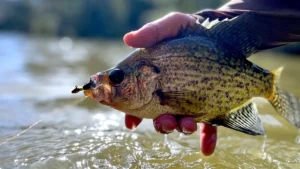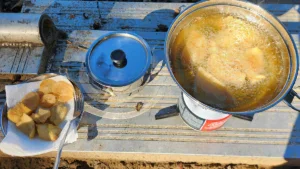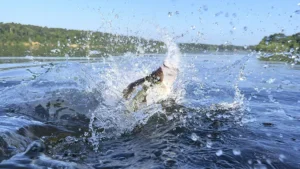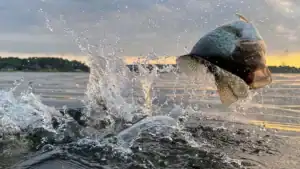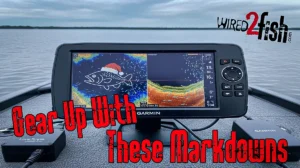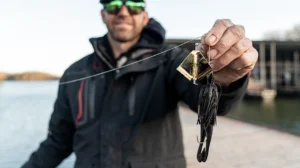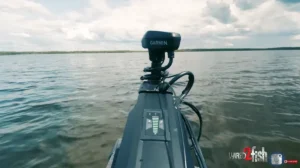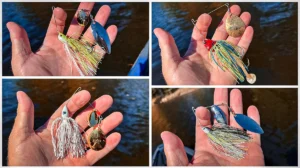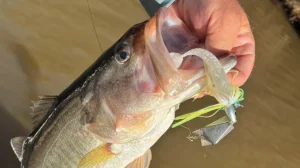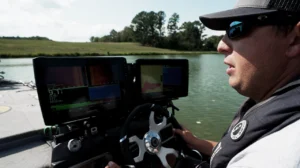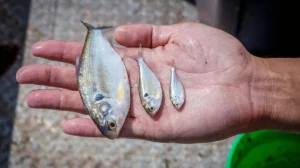From a seasonal standpoint, fall is easily our northern staff’s favorite time of the year to chase big crappies. Cooling water temperatures consolidate them in predictable locations, and they bite! Wired2fish’s Kyle Peterson and brother-in-law Brandon Schubert take Brandon’s new boat out on a maiden voyage in pursuit of slab crappies. With the fall crappie fishing season in full swing, Peterson unveils his process of locating and catching slab crappies using innovative new panfish jigs and plastic combinations.
TACKLE & FISH FINDERS (retail links)
TACKLE
- JIG – Z-Man Micro Shad HeadZ, 1/16-ounce: Buy at Tackle Warehouse
- PLASTIC 1 – Z-Man Baby BallerZ: Buy at Tackle Warehouse, Buy at Bass Pro Shops
- PLASTIC 2 – Z-Man Micro GOAT: Buy at Tackle Warehouse, Buy at Bass Pro Shops
- ROD – St. Croix Mojo Bass Trigon Spinning Rod, 7’3” Medium Light: Buy at Tackle Warehouse
- REEL – SEVIIN GS Series Spinning Reels GSS2000: Buy at Tackle Warehouse
- LINE (braided mainline) – Seaguar Smackdown Braided Line Flash Green, 10-pound: Buy at Tackle Warehouse, Buy at Bass Pro Shops
- LINE (fluorocarbon leader) – Seaguar Gold Label Fluorocarbon Leader Line, 10-pound: Buy at Tackle Warehouse, Buy at Bass Pro Shops
- NET – Frabill Trophy Haul Landing Net – Buy at Bass Pro Shops
ELECTRONICS
- LIVE SONAR – Garmin LiveScope Plus System (GLS10 & LVS34): Buy at Bass pro Shops
- FISH FINDER (bow stack) – Garmin GPSMAP 8612sxv: Buy at Bass Pro Shops
*Additional boat links below.
WHERE TO FIND FALL CRAPPIES
The journey begins with Peterson highlighting the significance of the turnover period, explaining how it affects crappies’ positioning. He notes the ideal water temperature (around 50 degrees), leading him to the crappie-rich basin areas of lakes. Here, he employs forward-facing sonar (FFS) to locate isolated schools of suspended fish. Keeping the boat off of them, Peterson and Schubert make targeted casts to the schools without spooking them.
HOW TO CHOOSE THE BEST JIG HEADS AND PLASTICS
The best crappie jigs for this sharp-shooting technique are ones that fall fast and hang horizontally on the retrieve. Additionally, Peterson prefers jig heads with detail. He feels realistic heads with eyes and head profiles pair well with micro plastics and get more bites. On this day, they experimented with a few seductive profiles from Z-Man’s Micro Finesse lineup of panfish-specific ElaZtech plastics. Exceptional action at slow speeds, coupled with extreme durability, proved its worth — they literally each used only one plastic during this half-day outing.
HOW TO AVOID SPOOKING FALL CRAPPIES
Perhaps the most crucial thing forward-facing sonar has taught us is that fish are often highly boat-shy. Peterson’s strategy revolves around casting jigs to the fish at 30- to 60-feet range. Any closer, and the schools would push away and not bite. As always with FFS, the key is observing and understanding fish behavior on any given day and adapting your tactics to keep the school around.
ROD SETUP FOR JIG FISHING SUSPENDED FALL CRAPPIES
Peterson recommends medium-light power rods longer than 7 feet for improved casting distance, handling, and overall versatility. Longer rods also have a better parabolic action, which helps keep crappie pinned without tearing their delicate mouths. He spools his crappie reels with a light braided line for strength and sensitivity. The no-stretch properties also facilitate solid hooksets on the cast. Not all braided lines are created equal. We favor soft and supple varieties for lightweight presentations and focus on diameter over break strength. We’ve found a .008-inch diameter braided line to be the optimal blend of stealth, handling, and strength for casting panfish applications. At the same time, a short section of fluorocarbon leader material delivers stealth and a little stretch on the business end of the setup.
BOAT SETUP (retail links)
- BOAT – Lund 2075 Impact XS: Check out at Lund Boats
- MOTOR – Mercury FourStroke Outboard, 200hp: Check out at Mercury Marine
- TROLLING MOTOR – Garmin Force Kraken Trolling Motor: Check out at Garmin, Buy at Bass Pro Shops
- FISH FINDER – Garmin ECHOMAP™ Ultra 126sv: Buy at Tackle Warehouse, Buy at Bass Pro Shops
- FORWARD-FACING SONAR – Panoptix LiveScope™ Plus System w/ GLS10 & LVS34 Transducer: Buy at Tackle Warehouse, Buy at Bass Pro Shops
- TOW VEHICLE – Toyota Tundra Platinum: Check out at Toyota


